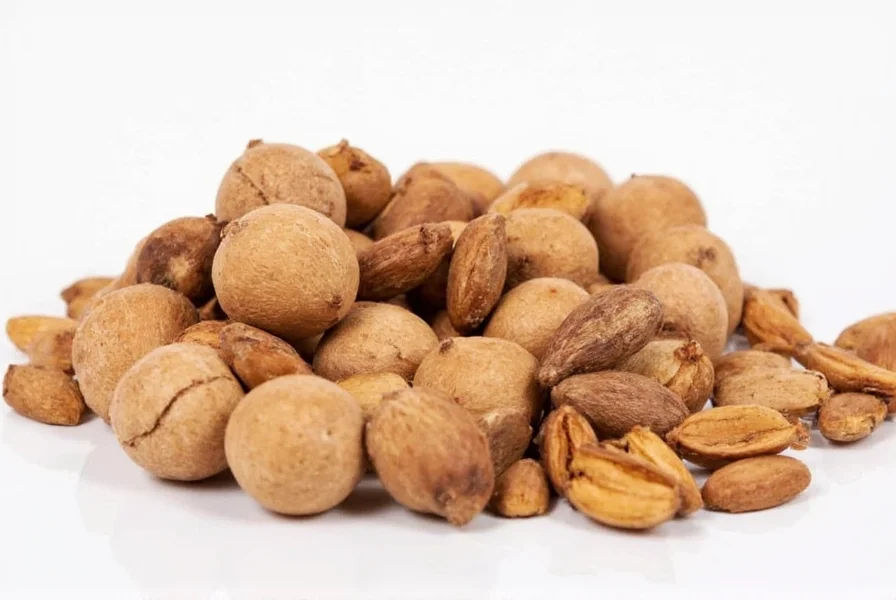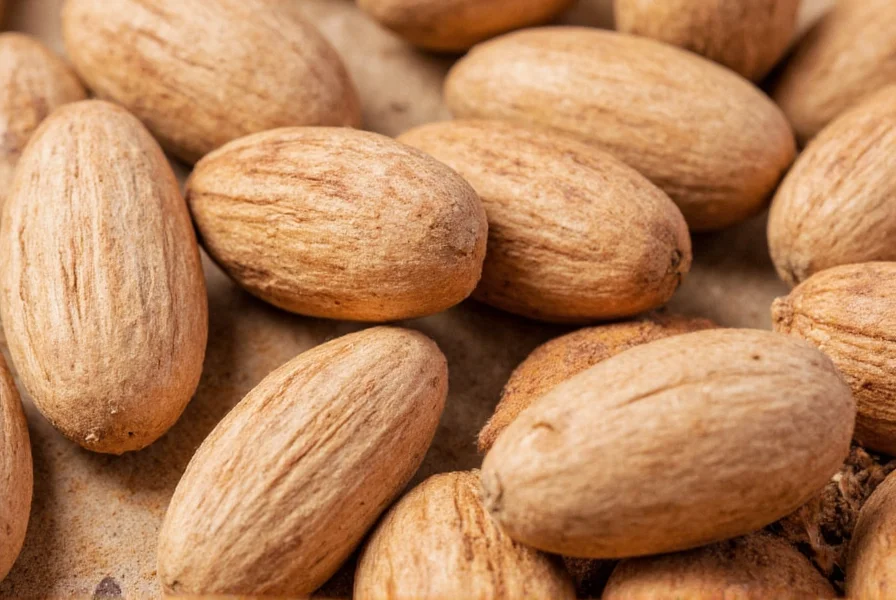For centuries, nutmeg has been valued not just as a culinary spice but as a medicinal herb across various traditional healing systems. Modern research continues to validate many of these historical uses, revealing the impressive range of health advantages this small seed provides. Unlike many supplements that promise benefits without evidence, nutmeg's advantages are increasingly supported by scientific studies examining its bioactive compounds and physiological effects.
Nutritional Profile of Nutmeg
Nutmeg packs a powerful nutritional punch despite its small serving size. Just one teaspoon (2 grams) of ground nutmeg contains:
| Nutrient | Amount per Teaspoon | % Daily Value |
|---|---|---|
| Calories | 12 | 1% |
| Fiber | 1g | 4% |
| Magnesium | 20mg | 5% |
| Copper | 0.1mg | 11% |
| Manganese | 0.1mg | 4% |
| Vitamin B6 | 0.05mg | 3% |
Beyond these basic nutrients, nutmeg contains over 30 bioactive compounds including myristicin, elemicin, and safrole, which contribute to its therapeutic properties. The most significant of these is myristicin, which has demonstrated neuroprotective and anti-inflammatory effects in multiple studies.
Top 7 Science-Backed Advantages of Nutmeg
1. Powerful Anti-Inflammatory Properties
Nutmeg contains several compounds that inhibit inflammatory pathways in the body. Research published in the Journal of Agricultural and Food Chemistry found that nutmeg extract significantly reduced inflammation markers in laboratory studies. The myristicin in nutmeg works by inhibiting COX-2 enzymes, similar to how some anti-inflammatory medications function, but without the same side effects when consumed in culinary amounts.
For those seeking natural ways to reduce inflammation from conditions like arthritis, incorporating nutmeg into your diet provides a flavorful approach to managing chronic inflammation. Adding just 1/4 teaspoon of nutmeg to soups, stews, or roasted vegetables can deliver these anti-inflammatory advantages without altering the dish's primary flavor profile.
2. Digestive Health Support
Traditional medicine systems from Ayurveda to Chinese medicine have long used nutmeg to address digestive issues. Modern science confirms these benefits—nutmeg stimulates digestive enzymes and helps regulate bowel movements. A study in Phytotherapy Research demonstrated that nutmeg extract improved gastrointestinal motility and reduced symptoms of indigestion.
When experiencing occasional digestive discomfort, a warm cup of milk with a pinch of nutmeg can soothe the stomach and promote healthy digestion. The spice's carminative properties help reduce gas and bloating, making it particularly valuable after heavy meals. For optimal digestive advantages of nutmeg in cooking, add it toward the end of cooking to preserve its volatile compounds.
3. Natural Sleep Enhancement
One of the most well-documented advantages of nutmeg relates to sleep quality. Nutmeg contains compounds that interact with GABA receptors in the brain, promoting relaxation and improving sleep duration. Research in Pharmacognosy Magazine found that nutmeg extract demonstrated sedative effects comparable to some prescription sleep medications, but with fewer side effects.
Unlike pharmaceutical sleep aids that can cause morning grogginess, nutmeg provides gentle sleep support. Try adding 1/4 teaspoon of nutmeg to warm almond milk before bedtime for a natural sleep remedy that won't leave you feeling drugged the next morning. This represents one of the most practical health benefits of nutmeg for modern lifestyles characterized by sleep deprivation.

4. Dental Health Benefits
Nutmeg's antimicrobial properties make it valuable for oral health. Studies show that nutmeg extract inhibits the growth of bacteria responsible for tooth decay and gum disease. The compound myristicin has demonstrated particular effectiveness against Streptococcus mutans, the primary bacteria causing cavities.
Traditional dental practices in Southeast Asia have used nutmeg for centuries to address toothaches and gum inflammation. Modern research supports these applications—applying a small amount of nutmeg powder directly to sore gums can provide temporary relief from discomfort. For daily dental advantages of nutmeg, consider adding a pinch to your toothpaste or creating a homemade mouth rinse with nutmeg and warm water.
5. Cognitive Function Improvement
Emerging research suggests nutmeg may support brain health and cognitive function. The myristicin in nutmeg inhibits acetylcholinesterase, an enzyme that breaks down acetylcholine—a neurotransmitter crucial for memory and learning. This mechanism is similar to some medications used for cognitive support.
A study in Neuroscience Letters found that chronic administration of nutmeg extract improved memory retention in animal models. While more human research is needed, these findings suggest that regular consumption of small amounts of nutmeg might contribute to long-term cognitive health. This represents one of the most promising health benefits of nutmeg for aging populations concerned about cognitive decline.
6. Natural Pain Relief Properties
Nutmeg contains compounds with analgesic properties that can help alleviate various types of pain. Research published in Journal of Ethnopharmacology demonstrated that nutmeg extract reduced pain responses in laboratory tests, suggesting potential benefits for managing chronic pain conditions.
The spice's anti-inflammatory effects contribute significantly to its pain-relieving properties. For joint pain or muscle soreness, topical applications containing nutmeg oil have shown promise in reducing discomfort. When exploring the therapeutic advantages of nutmeg for pain management, always use diluted preparations to avoid skin irritation.
7. Rich in Antioxidants
Nutmeg ranks surprisingly high on the antioxidant scale compared to many other spices. Its phenolic compounds effectively neutralize free radicals that contribute to cellular damage and chronic disease. A study in Food Chemistry found nutmeg's antioxidant capacity comparable to more celebrated antioxidant sources.
Regular consumption of nutmeg provides ongoing protection against oxidative stress, which underlies many age-related conditions. The spice's antioxidant advantages of nutmeg become particularly valuable when combined with other antioxidant-rich foods in a balanced diet. Unlike some antioxidant supplements that provide isolated compounds, nutmeg delivers a complex array of protective phytochemicals that work synergistically.
How to Incorporate Nutmeg Into Your Diet
To maximize the health advantages of nutmeg while avoiding potential side effects, follow these practical recommendations:
- Use freshly grated nutmeg whenever possible—pre-ground nutmeg loses potency faster
- Limit daily intake to 1/4 to 1/2 teaspoon (1-2 grams) for therapeutic benefits without risk
- Add nutmeg to warm beverages like milk, tea, or golden milk before bedtime
- Incorporate into savory dishes like soups, stews, and roasted vegetables
- Use in baking for desserts like pumpkin pie, apple crisp, or gingerbread
- Combine with other beneficial spices like cinnamon and ginger for enhanced effects
For the best flavor and maximum health benefits of nutmeg, purchase whole nutmeg seeds and use a microplane grater to prepare it fresh. Whole seeds retain their potency for up to two years when stored in an airtight container away from light, compared to pre-ground nutmeg which loses significant potency within six months.
Safety Considerations and Recommended Dosage
While nutmeg offers numerous advantages, it's essential to understand proper usage. Consuming more than 1-2 teaspoons (5-10 grams) can cause nutmeg toxicity, with symptoms including:
- Headaches and dizziness
- Nausea and vomiting
- Heart palpitations
- Delirium or hallucinations in extreme cases
These effects stem from myristicin's psychoactive properties at high doses. Pregnant women should avoid medicinal amounts of nutmeg, though culinary use is generally considered safe. Individuals taking certain medications, particularly antidepressants or sedatives, should consult their healthcare provider before using nutmeg medicinally.
The therapeutic window for nutmeg is narrow—just enough to provide benefits without causing adverse effects. This makes understanding the proper advantages of nutmeg dosage crucial for safe consumption. For most adults, 1/4 to 1/2 teaspoon daily provides optimal benefits without risk.

Conclusion: Maximizing Nutmeg's Health Potential
Nutmeg's impressive range of health advantages makes it far more than just a holiday spice. From reducing inflammation to improving sleep quality and supporting cognitive function, this versatile spice offers multiple evidence-based benefits when used appropriately. The key to harnessing the full advantages of nutmeg lies in consistent, moderate consumption as part of a balanced diet.
Unlike many trendy superfoods that come and go, nutmeg has stood the test of time across multiple traditional medicine systems, now increasingly validated by modern science. By incorporating this humble spice into your daily routine with attention to proper dosage, you can access its wide-ranging health benefits without significant risk.
Frequently Asked Questions
What is the recommended daily amount of nutmeg for health benefits?
The recommended daily amount for health benefits is 1/4 to 1/2 teaspoon (1-2 grams) of freshly grated nutmeg. This provides therapeutic benefits without risk of side effects. Consuming more than 1-2 teaspoons daily can cause adverse effects due to the myristicin content.
Can nutmeg really help with sleep problems?
Yes, research shows nutmeg contains compounds that interact with GABA receptors in the brain, promoting relaxation and improving sleep quality. Adding 1/4 teaspoon to warm milk before bedtime is a traditional remedy supported by scientific studies on nutmeg's sedative properties.
Is fresh nutmeg better than pre-ground for health benefits?
Yes, freshly grated nutmeg provides significantly more health benefits than pre-ground versions. Whole nutmeg seeds retain their volatile compounds and antioxidants much longer—up to two years when stored properly compared to six months for pre-ground nutmeg. The grinding process exposes the spice to air and light, accelerating nutrient degradation.
Can nutmeg interact with medications?
Nutmeg may interact with certain medications, particularly antidepressants (MAOIs and SSRIs), sedatives, and blood thinners. The myristicin in nutmeg can enhance the effects of these medications, potentially causing adverse reactions. If you take any prescription medications, consult your healthcare provider before using nutmeg medicinally.
What are the main health benefits of nutmeg for digestion?
Nutmeg supports digestion by stimulating digestive enzymes, regulating bowel movements, and reducing gas and bloating. Its carminative properties help soothe the gastrointestinal tract, making it particularly beneficial after heavy meals. Research shows nutmeg extract improves gastrointestinal motility and reduces symptoms of indigestion when consumed in culinary amounts.











 浙公网安备
33010002000092号
浙公网安备
33010002000092号 浙B2-20120091-4
浙B2-20120091-4